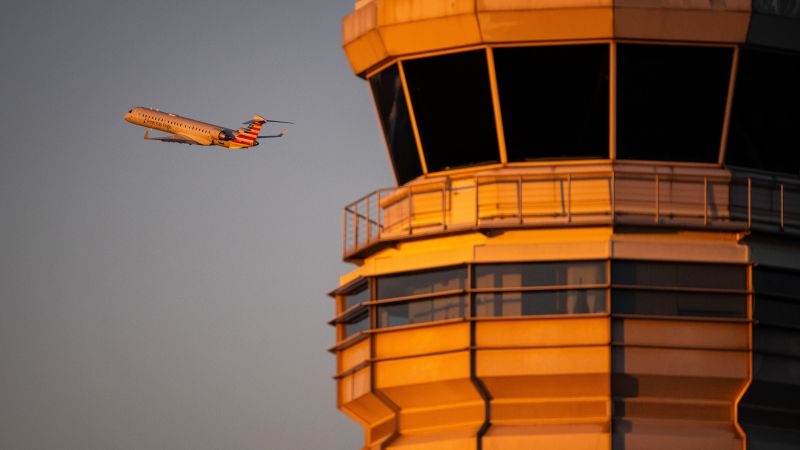Copyright Cable News Network

Almost everyone agrees that the US air traffic control system is broken. Longstanding staffing shortages. Antiquated technology. And now, air traffic controllers are caught in the middle of a political tug of war that has nothing to do with their operations. The government shutdown has left controllers working unpaid, six-day-weeks. That’s worsened a staffing crisis, with some airports’ control towers occasionally being without any controllers at all. And now that crisis, combined with the shutdown, has led to Federal Aviation Administration limits on flights at the nation’s 40 largest airports, with hundreds of flight cancellations daily and disruptions across the country. There’s no immediate remedy. But some experts say there are solutions that could change the dynamic in relatively short order — either privatize air traffic control or set up a separate government corporation that can run the system. Advocates of privatization, or at least separation of the service from the FAA, think the current crisis might create an opportunity for reform. “It opens a window to have this looked at seriously,” said Robert Poole, director of transportation policy at the Reason Foundation, a libertarian think tank, which has been working on ATC privatization since 1981. The US Postal Service already operates as a separate government-controlled corporation, providing service to communities large and small. And while the USPS has its own problems, its employees are still getting paid during the shutdown and mail deliveries haven’t been reduced. Arguments for privatization Poole and other advocates want the service privatized either an independent not-for-profit corporation — as was done in Canada in 1995 — or as a separate government-controlled corporation with a dedicated revenue stream from fees and taxes collected from airlines and passengers. They argue this is the best way to get the air traffic control system the resources it needs to modernize and for a much-needed hiring increase. Keeping the system within the Federal Aviation Administration hampers both efforts, they argue. Privatization or separation from the FAA would be more efficient than the current system, said Michael McCormick, professor of air traffic management at Embry-Riddle Aeronautical University in Daytona Beach, Florida. “Being tied to the annual (congressional) appropriation bill means you don’t get secured funding, and you can’t really engage in active planning for investments, particularly capital investments,” he said. With some form of privatization, McCormick said, “you can plan better for how you’re going to develop infrastructure.” He added that there are different forms of privatization, with some services more under the control of the government than others, but none are a for-profit model that would allow investors to demand profit over safety. Privatization foes But Transportation Secretary Sean Duffy has declared privatization a non-starter and a distraction from efforts to improve the system, despite Trump’s support of the idea in the past. “Privatization is a fight that someone else can have at some other point,” Duffy said at an August press conference. The last privatization effort in 2017 and 2018 actually had the support of both the airline industry and the National Air Traffic Controllers Association (NATCA), the union representing the controllers. It was the first time those key parties both agreed with the privatization efforts, said McCormick. But he said private plane owners and pilots and operators of business jets were able to kill the bill over concerns their ATC costs at smaller airports would jump. Those groups have a surprisingly powerful lobby, McCormick noted, with enough members of Congress who are pilots to form a “general aviation caucus.” And the business travel sector serves the interests of many of the nation’s largest and most powerful corporations. The private plane owners and business jet operators have a financial incentive to fight privatization, as they currently are paying only about 10% of the cost of providing ATC at small airports through fees and fuel taxes, according to McCormick. Arguments against privatization Those groups are still opposed to privatization. “We do have the largest, most complex and safest system in the world. Others have pointed to a privatized model … if you look at some of them around the globe, you’ll see that they have almost the same problems as the United States does with respect to staffing, with respect to funding,” said Jim Coon, senior vice president for government affairs and advocacy for the Aircraft Owners and Pilots Association. He agrees the system needs modernizing – but he says privatizing the ATC could disproportionately hurt smaller airports like the ones private planes use. “A privatized, economic-based air traffic control system really hurts the small world communities around the country, where their airports are really sometimes a lifeline of these communities,” he said. “Airports like New York and Los Angeles and Atlanta — that’s where the investment will go.” The controllers’ union and Airlines for America (A4A), the commercial airlines’ trade association, declined to directly address the question of privatization when asked on Friday. The airlines trade group pointed to a joint letter it and other aviation groups sent to Congress in February calling for unity in support of modernizing the ATC system. Trump’s domestic policy bill, passed in July, includes $12.5 billion in modernization funding. That money is a new opportunity for the country’s ATC system, said Coons. “Congress has debated this issue, and they put it aside,” he said. “I think we have a rare chance here to get everyone together and get our system modernized as fast as possible.”



